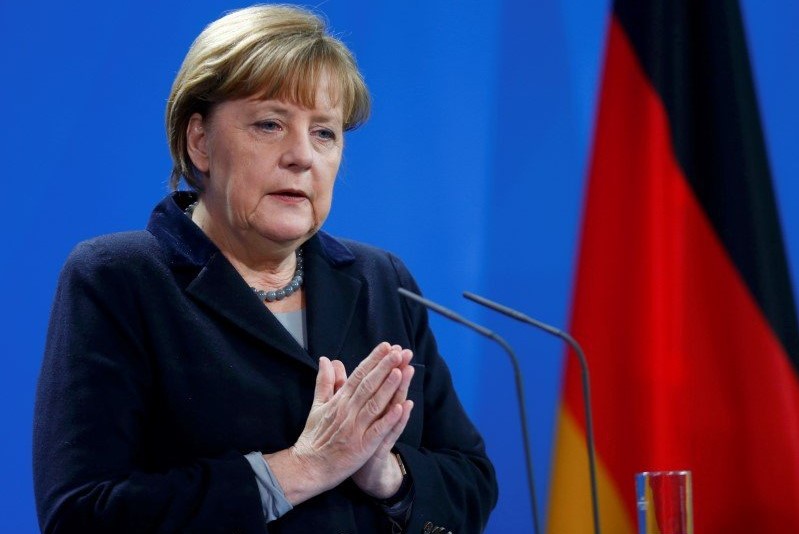Reuters photo
By
Sarah Ito
Angela Merkel and the Anarchy of the Refugee Crisis
It has often been debated that the sons bear the weight of the sins of the fathers. In the United States, many political and pop-culture figures would have us believe that we in the 21st century are responsible for the injustices visited upon Native Americans and those who trace their lineage to slaves. The remedy that is usually proffered is cash, or land givebacks, to those who are determined to have been retroactively harmed. In Europe, Germany, too, has its own peculiar approach to past misdeeds. In today’s Germany, lingering guilt over the Holocaust has resulted in a conflagration of a different, but nonetheless, horrific nature.
Germany boasts the strongest economy in Europe. It is renowned for its classic literature, music, architecture and precise mode of thinking; high tech, yet steeped in antiquities, set against the backdrop of lush Alpine mountainscapes. The country ticktocks to a brisk internal rhythm, as if some invisible metronome is setting the pace. Still, there is a certain sadness, almost a depression, that is part of the post WWII German psyche…German guilt.
As a young soldier stationed in Berlin as the Wall was coming down, I found the German people to be welcoming and inquisitive about all things American. They were proud of their heritage and would cheerfully chat on about the history of the Brandenburg Gate, the writings of Goethe, the pastry shop on the Tauentzienstrasse that was a “must.” But to ask a pensioner about the war years, about the darkness that was the Nazi regime, the conversation would come to an abrupt halt. “You wish to learn about the Nazis? There are no Nazis here. Go to Argentina, that’s where they are.”
Even today, the German people wear a crown of thorns thrust upon them by their history. The collective sense of guilt and shame for those acts committed on one’s home soil, perpetuated in the name of one’s country, while an alternate nation of “good” Germans looked the other way, perhaps from fear, perhaps in denial … that burden is enough to cripple any person of morals. German guilt.
As the continent’s political views shifted in the latter part of the 20th century, an uptick in populist, right-wing beliefs helped elect Angela Merkel, in 2005, as Germany’s Chancellor and de facto leader of the European Union. Merkel was, and is, widely thought to embody Western liberal values, and so was a strong pick to slow down some of the more extreme purveyors of German nationalism. With her power affirmed, and the Syrian refugee crisis escalating, Mrs. Merkel inexplicably let her critical thinking be consumed by her German guilt. It began by letting her heart think for her head, undertaking a weakly contrived mission to save Syrians from themselves. In a departure from post-WWII reluctance to involve Germany directly in military actions, she authorized the sending of arms to Kurdish fighters.
Not satisfied with keeping a safe distance from disaster, she embraced fatal compassion yet again, and permitted entrance to the first wave of asylum-seekers. Undocumented, unregistered, largely unsupported by social services, and predominately young males, the tsunami exploded across Germany and onto the hapless shores of other EU nations. The United Nations High Commission for Refugees gives a figure of 300,000 Syrian refugees who have applied for asylum in Germany, while the German Federal Minister of the Interior estimates that number to be 105,000 as of the close of 2015. The German Federal Police (BKA) report that close to one million refugees arrived in 2015, from Iraq, Afghanistan, Syria and North Africa. In point of fact, German officials do not know how many Muslim refugees are living in Germany. They do not know the names nor the status of most. What is uncontested is that on New Years Eve 2015, more than 1200 women were assaulted in cities across the nation; these attacks committed by gangs of refugees, who robbed countless revellers as well.
This trend continues, as tracked and reported by the Gatestone Institute International Policy Council, as well as the German Federal Police, and include attacks on refugees by refugees. Further, as reported by Adam LeBor in Newsweek, September 5, 2015, 80% of refugees are Muslim, and 80% are male. Therein lies the problem, when one considers that these men are largely without skills, bereft of the language of their new country, and from a culture that views contemporary western values, and women, from an alarmingly violent perspective.
Angela Merkel has offered no definitive explanation as to why she allowed uncontrolled migration into Germany. She has, at various times, been accused of acting on a whim, as reported by Der Spiegel and The Guardian. Mrs. Merkel has countered by saying that it was the right thing to do; that she wished to show “the smiling, friendly face of Germany” and that to do anything less “would not be my Germany.” Mrs. Merkel has discounted the true “owners” of Germany: the German citizen. Her gut reaction to a tragic, gut-wrenching situation was based on emotion, not rationale, and thus has loosed a parallel tragedy.
A leader of a strong nation places the safety and security of his/her people first, and seeks the counsel of the people and the elected officials before undertaking an action that alters the socioeconomic landscape of a nation. Mrs. Merkel cannot make reparations for the past; no one can. In her misguided choices, she has paved a new road to hell with her self-proclaimed good intentions, and created a nightmare for which she can, indeed, claim guilt.
Sarah Ito
I am a novelist (GROWING UP GREENWICH, Outskirts Press), blogger and essayist, and occasional poet.



No Comments Yet!
You can be first to comment this post!